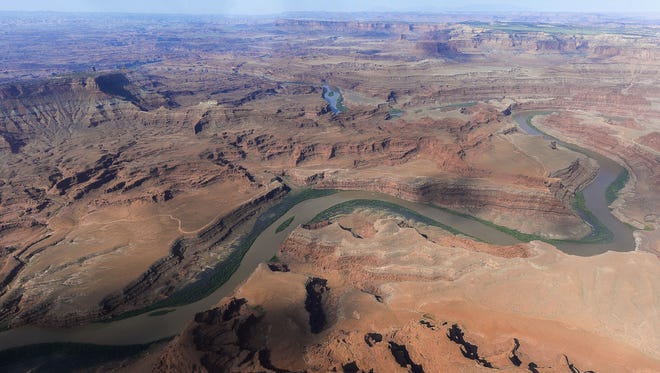Amid public land battle, outdoor industry boasts $887 billion impact

Clarification: A previous version of this story misidentified the organizer of the Outdoor Retailer show.
Outdoor recreation accounts for $887 billion in consumer spending each year and supports 7.6 million American jobs, according to a new report.
The Outdoor Recreation Economy report, released by the Outdoor Industry Association (OIA) highlights the massive economic impact of outdoor recreation which includes hunting, fishing, hiking, and wildlife viewing, in the United States. National parks, wildlife refuges, national monuments and other public lands and waters account for $35 billion in economic output and 396,000 jobs in the U.S., according to the report.
“Public lands and waters are the outdoor industry’s basic infrastructure, and without the the industry cannot survive,” the report says.
Amy Roberts, OIA executive director, said the report makes it clear outdoor recreation economy is a “powerful economic force” in the country.
“Public lands and waters are the foundation of this powerful economic force,” she said. “By investing in and protecting America’s public lands and waters, we invest in our future and the continued well-being of America. Together, we can thrive outside.”
The report comes amid debate over public lands in the United States and calls to release some public lands to states for management. The president could sign an executive order Wednesday calling on the Interior Department secretary to examine whether national monument designations made over the past two decades are in line with the Antiquities Act, which allows presidents to designate areas of land as national monuments, the Salt Lake Tribune and Washington Post reported.
The battle over public lands has most notably played out in Utah, home to the Bears Ears National Monument. In December, former President Obama designated 1.35 million acres in the Four Corners region as the Bears Ears National Monument. The designation was seen as a major victory for Native American tribes, conservationists and outdoor enthusiasts, though seen as a blow to many state Republicans and rural groups that worried it will deter energy development and should be managed on a state level.

Utah lawmakers calls for the president to rescind the Bears Ears national monument designation has resulted in some economic turmoil in the state. The twice-yearly Outdoor Retailer was held in Utah since 1996 and brought the state $45 million in annual direct spending, but the organizers began looking for another host city after it became clear Utah lawmakers were not going to back down on calls to rescind the national monument designation.
OIA plans to release a more in depth report with a breakdown on outdoor recreation's economic impact in all 50 states and 435 U.S. congressional districts, so lawmakers will be able to point to hard numbers in the future.
"The congressional district level data will really help specifically house members understand what is the current impact of outdoor recreation in our district, number of jobs supported in our district," Roberts said in a phone interview.
Roberts adds the report proves that the "industry continues to grow year-over-year" and "offers sustainable economic impact."
More coverage:
GOP leaders want some national monument designations revoked
The stunning way Patagonia is trying to defend threatened public lands